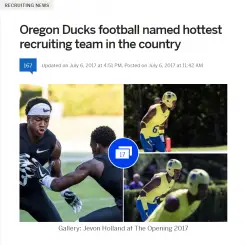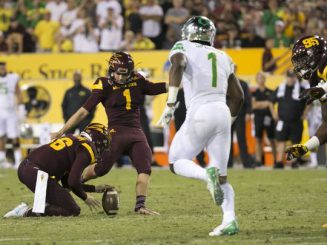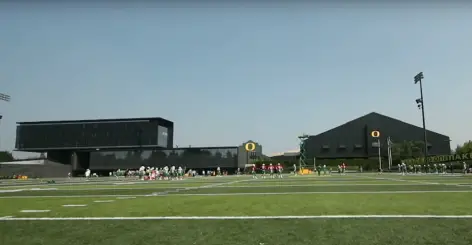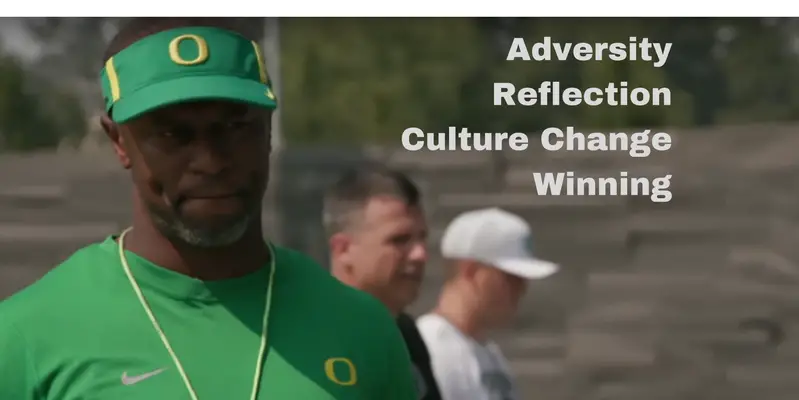It’s late in 2019, and another Oregon Ducks football season has just ended. The morning has broken gray and gloomy, rain flinging itself against the glass facade of the Hatfield-Dowlin Complex as if delivering a million tiny blows from an angry sky. Willie Taggart swivels his desk chair to look out of his rain-dappled window onto the practice fields.
The weather this December morning doesn’t match his mood, however, as a satisfied sigh escapes his lips. It’s been two days since Oregon clinched the 2019 Pac-12 Championship with a win over USC.
After Michigan failed to win big in their title game, Oregon was ranked 4th in the nation going into the game and could climb higher. Oregon’s first playoff spot since 2014 is now guaranteed. That year, they destroyed Florida State University (59-20) before losing the championship to Ohio State (41-20).
Willie reflects back on his journey since he joined the University of Oregon. Mark Helfrich had been fired, and it was the year after a 4-8 season. He’d brought in some of the best recruiters and coordinators in the game: Jim Leavitt, Mario Cristobal, Marcus Arroyo, and Joe Salave’a. That had paid off in spades in terms of recruiting, with Oregon breaking into the Top 10 in recruiting for both 2018 and 2019.

The recruits of today are the champions of tomorrow.
It paid off in other ways as well, namely a complete culture change (and the winning, of course). After the 4-8 debacle of 2016, blame was rightly laid at the feet of the coaching staff. A staff that hadn’t been able to maintain a fragile culture that was tied too closely to always winning against the lesser teams of the Pac-12. It was no longer the Pac-12 of the Chip Kelly era.
So-called easy wins became battles, and close games were almost always late losses. Blowout losses were common, and long streaks ended against many. The Ducks lost to in-state rival Oregon State. It was the nail in the proverbial coffin – sized to fit the entire existing coaching staff.
The new coaching staff understood the process was one they had to commit to. They knew they’d have to own the inevitable growing pains of rebuilding a program, and not overnight either. Willie leaned back in his chair as he thought back to the challenges of his first season.
It was an up-and-down affair after three opening wins against weak foes. An early loss to Arizona State University (1-2 record at the time) galvanized both the coaches and players to work harder – 14 penalties (99 yards), blown assignments, and self-inflicted wounds on the offensive line lead to a two-point loss after a late final drive fell short.

A late field goal was the difference vs. ASU
This renewed determination led to the throttling of the California Bears 45-24 at Autzen, where the Ducks leapt out to a 17-0 lead on the shoulders of Justin Herbert and Royce Freeman. Unfortunately, both Herbert and Freeman hurt those shoulders early on and the offense sputtered with Taylor Alie filling in at quarterback. The defense however, was indomitable, holding California to one of nine on third down, recording seven sacks and only allowing eight yards rushing for the entire game.
In the second half, the offensive scheme was adjusted, and scoring resumed following the lead of Kani Benoit and Tony Brooks-James. However, Alie went out with what appeared to be a concussion, not only forcing true freshman Braxton Burmeister into action (burning his redshirt), but also forcing the offensive line to step up and finish the game. They used predictable, yet successful, running plays on nearly every one.
The joy of the 45-24 win at home was tempered by the plethora of injuries and the news that Herbert was out four to six weeks with a broken collarbone. Added to that was the uncertainty of a long list of injuries to other key players including Freeman, Dillon Mitchell, Charles Nelson; most of them listed as simply “day to day,” a euphemism for the sprains and deep bruises that sometimes have a mind of their own in healing. Kaulana Apelu, it turned out, had fractured his ankle and was out for the season, another blow to a very young defense. The following play is how Royce hurt his shoulder.
Willie shakes his head, and he thinks back to the bitter taste that win left in everyone’s mouth.
Oregon were 4-1 after beating Cal. They matched the win total from the year before. But the top athletes on offense were all on the sideline. As a result, the defense was heading ever deeper into the freshman ranks to find starters.
This was all coming right when the schedule was about to get a lot more difficult, with a bye week a long ways off. Next up on the schedule was Washington State University, coming off two straight wins against the Ducks, and off to their best start in more than a decade. The whipping post of the Pac-12 for what seemed like forever was now looking like the whip, having beaten No. 5 ranked USC and Sam Darnold at home 30-27 just the week before.
Willie grits his teeth as he recalls memories of how hard the defense fought at home. A battle well fought, but ultimately in vain, as the Ducks offense simply couldn’t keep up with Luke Falk and the Cougars without a credible downfield threat. The following play against USC is a good example of why he is a bonafide NFL prospect.
Oregon had rebounded with wins against mediocre Stanford and UCLA on the road. But then dropped two straight to Utah and Washington. The Ducks finished with two wins against bottom dwellers Arizona and Oregon State.
However, 8-4 was a huge improvement over 2016. Oregon was getting national buzz again as folks looked forward to 2018 and a full season of Herbert.
2018 went much like 2017, but with more wins, as the defense continued to mature and Herbert’s mastery of the offense did likewise. Although some key players had left for the NFL, the cupboard was no longer bare as in previous years. Nay, it was rich with a storehouse of top recruits from around the country ready and willing to step into whatever role would get them on the field the fastest.
Losses to USC and Washington led the Ducks to the Holiday Bowl and a 10-2 regular season record, but the biggest test for Willie was yet to come, getting Herbert to come back for his senior year.
Like recruiting Royce to stay for his senior year, Willie chuckles a bit when he remembers what the other coaches described as his “marketing campaign” to convince Herbert to stay. Ultimately, Herbert felt that since he hadn’t started all of the games in his freshman season and had lost five games to injury as a sophomore, he still had one more season in him at the collegiate level. We needed the downfield threat that Herbert’s arm gives us, as shown in the following clip.
This was coupled with the fact that he would be a contender for the Heisman and undisputed best at the position in the Pac-12 with Sam Darnold, Luke Falk and Jake Browning already having left for the NFL. The entire season would be his showcase.
Unlike the previous Ducks teams that had reached the title game, the 2019 team had a defense that wasn’t just good, but great. Much like the hated Washington Huskies, Leavitt had done things the right way by changing the culture, instilling a new heart into the defense, and building it little by little until the team could dominate on both sides of the ball.
And dominate they did. The similarities to the Chip Kelly years were there for sure. Blowout after blowout. Takeaways for the defense. Stepping on the opponent’s neck and not letting up until the final whistle.
They had rolled through the season unbeaten, shattering records along the way. Though naysayers would point to a relatively weak Pac-12 overall, the opening game win over top-10 ranked Auburn was enough to balance this out and keep them ranked highly all season, headed back to the playoffs.

Looking down on this field is the perfect place to reflect on and overcome adversity.
Willie enjoys this quiet moment of reflection as the sky begins to clear. Faint sunbeams dance on the practice fields. The grin on Willie’s face slowly fades, to be replaced by one of determination, reflecting back to him on the drying glass. The expression says “time to get back to work” – two more games to prepare for, two more games to win. It’s time to bring the championship trophy to Eugene.
David Miller
Washington, DC
Top photo credit: from Video
Related Articles:
Why Oregon Football Always Belongs in the National Conversation
The B1G Won the 2026 Coaching Carousel...Big-Time!
Continuity? Lanning's Hiring Success is Put to the Test
Why Whether Dyer Was Down or Not...Doesn't Matter
How to Analyze Football Talent Like a Pro
Some Thoughts as the Football Withdrawals Kick In
David, a father of two young Oregon fans, has been a Duck all his life after growing up in Eugene. Although not UO Alumni, his wife was a Journalism major there, and he has stayed true to his Ducks wherever life has taken him. In addition to watching the Ducks each Saturday with up to 200 fans at the Irish Channel in Washington, D.C., he has enjoyed playing tackle football with friends each fall for 25 consecutive years, regularly implementing the latest Oregon offensive wrinkle to stymie defenses. David has been writing short stories all of his adult life for fun and is excited to be writing about the Ducks on Fishduck.com.

